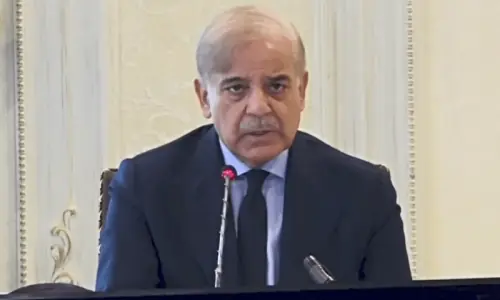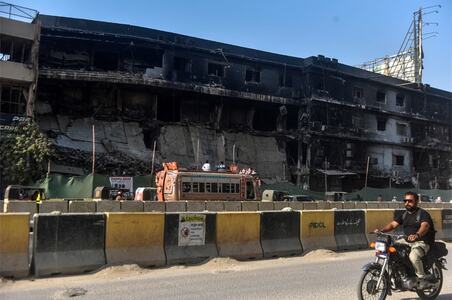
KARACHI, Feb 17: The fourth Karachi Literature Festival ended with a fiery and intense speech by George Galloway and a prize for the best non-fiction book of 2012 for ‘The Punjab – bloodied, partitioned and cleansed’ by Dr Ishtiaq Ahmed.
Mr Galloway, in his typically impassioned style, congratulated the organisers of the festival for hosting a successful event and expressed his fondness for the venue saying “‘the ocean stretching out, the sun shining… I could stay here for the rest of my life.” He said the festival had confounded many stereotypes. One of them was that Islam was somehow an enemy of literature, books and culture. “This is a Muslim country. We love books, we all like writing.” He urged everybody to buy books with the assurance that Kindle would never replace books.
Mr Galloway touched on another stereotype with respect to Oxford University Press (organisers of the event) and the English language. He said Britain did not have to export cruise missiles and helicopters and instead could export books and culture and be loved by the world. He agreed with the earlier speaker, Ameena Saiyid, that Karachi and Pakistan were open for business. He said the vast majority of this country comprised good people and rued that it took him 15 years to return to Pakistan.
During the speech Mr Galloway severely criticised America and Britain for their policies (using phrases like Professorial Obama, the sun never sets on the British Empire because God would not trust Britain in the dark). He argued that incidents like 9/11 came out of the swamp of bitterness and hatred, out of the west’s injustices against the east. He said to his mind there were three important points which could resolve the issues: (1) Stop supporting Israeli actions against the Palestinian people, (2) stop invading and occupying Muslim countries, and (3) stop supporting tyrant and dictators in the name of spreading democracy.
Before Mr Galloway, OUP managing director Ameena Saiyid thanked everyone for making the festival a success. She added that the event was a kaleidoscope of insights and perspectives. Asif Farrukhi said the KLF must go on. He remembered the victims of an attack in Quetta on Saturday and quoted Faiz’s line which meant ‘keep the flame alive’. Ms Saiyid just before the end asked everyone to observe a minute’s silence for the victims of Quetta blast.
Earlier the final day of the festival kicked off with a nice little session on emerging writers. Moderated by Mohammed Hanif, it had novelist Shazaf Fatima Haider, poet Syed Kashif Raza and travel writer Masood Alam as the new talented writers. All of them read out from their latest works and impressed the audience.
Shazaf Fatima said her novel ‘How it happened’ was about a conservative Shia family. Sunni elements also entered into family politics. The principal character was of Dadi who’s looking for a perfect girl for her grandson.
The passage that the author read out in which she explained Dadi’s list of what a perfect girl should have, had meaningful humour which the audience enjoyed.
Kashif Raza recited a couple of very sensitive poems, beginning with ‘Hum apni zindagi ke liyey shukr guzar hain’. His poems reflected the current sectarian and socio-cultural problems that society was faced with.
Masood Alam read out a piece from his travelogue, Chalo. It was also well-received.
A session on dynastic politics was conducted by Najam Sethi.
Indian journalist Barkha Dutt said there was a joke in India that both the BJP and Congress were parivar (family) parties, because the Congress had the stranglehold of the Gandhi family whereas the BJP was remote-controlled by the Sang Parivar. At the same time there was an individual narrative such as the one that came from Mahatama Gandhi or M. A. Jinnah where there was no dynastic politics, she said.
Victoria Schofield said with reference to Europe things were different because of education. Education reduced the appeal of a particular family. But, “we have been at it for hundreds of years.” Responding to Najam Sethi’s question, Ms Schofield said if Zulfikar Ali Bhutto had not been sentenced to death, Benazir Bhutto would have joined the foreign office or public service. She was not destined for a career in politics.
A discussion on history brought together Dr Mubarak Ali and Dr Jaffer Ahmed. Replying to a question, DrAli said when atrocities were committed in East Pakistan, the people of West Pakistan sided with the army. The same thing was happening in Balochistan today. With respect to the Arabs’ conquest of Sindh, he said history was written by the victor which was why one got to hear only one perspective.
Dr Ahmed said with the presence of Pakistan’s privileged classes, the military had played the role of the mediator. That was why the hero worship that one read in course books reflected the army’s point of view.
Zehra Nigah and Intizar Husain charmed the audience with their discussion on Urdu classics moderated by Asif Farrukhi.
Zehra Nigah read out many a piece from classic ghazals and nazms. She said quality poetry stirred the faculties of the reader and made him think that he too had that particular thought but couldn’t express it.
Intizar Husain went down memory lane and recalled when Zehra Nigah took part in her very first mushair in Lahore. Jigar Murabadabadi was also supposed to read at the symposium. He came after Nigah, but when he started to recite his poetry, the audience shouted that they wanted to hear Nigah.
A conversation with Najam Sethi hosted by Muneeb Farooq generated quite a bit of interest. With reference to their TV show, Muneeb told the audience that both he and Mr Sethi did not plan anything before going on air.
He said when he toyed with the idea of anchoring a show with Mr Sethi, people warned him that he would be overshadowed, to which he replied he had nothing to lose; he would only learn. Najam Sethi praised Farooq’s perseverance. He said it took a great deal of time to develop sources in important institutions and political parties. Speaking about the chirya (bird) that he often alluded to on his programme, Mr Sethi said he had friends in every important institution and political party. The word chirya came from the English phrase ‘little birdie told me’.
Replying to a question put to him by an audience member, he said if the people should continue on the path of election then no army, no judiciary could undermine them.
A session on the situation of the Urdu language had Arifa Syeda Zehra as the main speaker. She raised the question that how could our language be self-sufficient if we ourselves didn’t live in a self-sufficient society?
The highlight of the first half the day was a conversation with Palestinian author Izzeldin Abuelaish conducted by Raza Rumi.
Mr Abuelaish spoke with great passion and sensitivity. He said when his three daughters were killed in Gaza by Israeli soldiers he was worried about his son. But his son took him by surprise. He told him not to cry because his sisters had joined their mother in heavens, and they were happy.
He said violence and terrorism were diseases and like every disease they had causes. It was important to get to the root of the problem. He said when he interacted with Israeli soldiers (since he’s a doctor), he would try and prove to them that they were equal human beings. He said when he handed over a baby to its mother (being a gynecologist), it gave him great happiness as newborns were the same everywhere – they were not Israelis or Palestinians or Pakistanis.
He said we should raise the question as to what kind of legacy we were leaving for our children and shed light on the importance of freedom. He remarked that the Palestinians were deprived of their freedom; however they would never be defeated. He eloquently put that justice was something that one liked for oneself as well as for others.
At the launch of the book ‘Poora Manto’, Dr Shamim Hanafi said Manto had always been ill-treated by his publishers. He rued the fact that out of the 237 stories that the writer had written only those were highlighted which had to do with partition riots or had sexual content in them.
The second half of the day had a session titled ‘Punjabiyat’.
Writer Mohammed Hanif looked confused at the topic and when the moderator asked him about the role of Punjabis in his writings, he said one of the characters in his book ‘A case of exploding mangoes’, Gen Ziaul Haq, was Punjabi.
Nadeem Aslam said when he first landed in England he would not believe his teacher when she’d say ‘A for apple’; he would respond that ‘A for saeb’. There was a time when he thought Punjabi was spoken all around the planet.
Another simultaneous session was on India-Pakistan Discourse.
Ashraf Jahangir Qazi said both India and Pakistan should address the concern of its adversary. A. G. Noorani argued something was missing in Pakistan Indian relations. They didn’t reach out to each other.
A discussion on ‘Pakistan Through Foreign Eyes’ featured some known journalists. Declan Walsh said the world was now looking at Pakistan differently. Responding to a question put to him by the moderator, he said the publication he worked for had distinction between editorial and news pages. Even the op-ed pages had a different set-up.
Yasin Musharbash on the other hand said the publication he worked for wanted the author to share his opinion — there was no separate editorial board.
Mr Walsh said though the Pakistani media was very critical of things, there were certain areas where it still did not speak openly.
Apart from that, distinguished artist Zia Mohyeddin read out excerpts from his book ‘A carrot is a carrot’. It was a well-attended programme. A conversation with Amjad Islam Amjad conducted by Ahmed Shah also drew a decent crowd as did a discussion on humorous poetry participated by Ataul Haq Qasmi and Anwar Masood.































